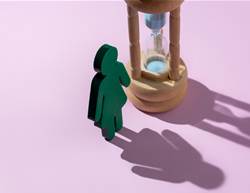Dealing with perimenopause or menopause symptoms is difficult at any time of year, but Christmas can be particularly challenging.
Everything from the energy involved in preparing for the celebrations to the food and drinks consumed can make it that little harder to keep on an even keel.
The common symptoms of menopause - muscle aches, palpitations, hot flushes, night sweats, anxiety, insomnia, forgetfulness, fatigue, and mood swings - are also exacerbated by stress and tiredness.
Here are some tips for surviving the festive whirl.
Watch your alcohol consumption
Many women say drinking alcohol – especially red wine – triggers hot flushes. The scientific community is still divided on the issue, with one survey finding that women who drank alcohol daily were much more likely to report hot flashes and night sweats.
On the other hand, a 2017 study found the nutrients and hops found in beer may help to relieve hot flashes and other common symptoms.
If you suspect alcohol is causing issues for you, there are a huge range of non-alcoholic options available on shelf these days, in categories ranging from beer to seltzers and spirits.
Foods to moderate
Processed party foods such as potato chips and cookies are usually high in sodium, loaded with added sugars, or both, which can make you retain water and feel bloated.
Additionally, meats that are high in saturated fat, such as pork with crackling and bacon can lower the body’s serotonin levels, which can lead to you feeling angry, grumpy and irritable.
Be honest about how you’re feeling
“Most people will be spending time with their families over the holidays and it’s actually a great time to be open with your loved ones about the menopause,” Meg Matthews suggests at RedOnline.
“If you’re struggling with crippling anxiety, overwhelming fatigue, terrible hot flushes and foggy brain, don’t try to hide how you’re feeling. If someone asks you if you’re feeling alright, don’t just brush things off with a, ‘I’m fine’. Yes, Christmas is supposed to be a time of good cheer and nobody likes a whinger, but you’re not just having a moan. What you’re experiencing is very, very real and it’s a good idea to try and communicate that to your family. They might not completely get it, but at least they’ll have a fair idea of what’s going on.”
Keep your cool
Christmas Day is a prime time for feeling hot and bothered, especially if your family and friends love a festive feast with all the trimmings.
If you are cooking, make sure the kitchen well ventilated and that you wear cool natural fibres.
Keep a jug of iced water at hand and keep hydrated throughout the day and put a spritzer bottle of water in the fridge and use liberally when you feel flushed.
Take time out
Acknowledge that you are experiencing rollercoaster changes in your hormone levels, which can leave you feeling extremely fatigued and stressed. Don't feel guilty about curling up on the sofa for a few minutes to recharge or even having a quick power nap.
Get outside for a walk if you can – the fresh air will help revive you if your body is aching and you're feeling exhausted.
If you can't manage a walk, try standing outside alone in the fresh air for a minute and do a few deep breathing exercises.
"Slow breathing helps you regain calm, plus it can also turn down the body’s thermostat," Stephanie Osfield suggests. "Try taking six to eight breaths per minute (that’s about five seconds in, five seconds out) for 15 minutes twice daily, or whenever you feel a hot flush coming on."









